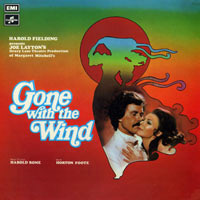Scarlett (musical)
This article needs additional citations for verification. (February 2017) |
| Scarlett | |
|---|---|
| Gone With The Wind | |
 Original London Cast recording | |
| Music | Harold Rome |
| Lyrics | Harold Rome |
| Book | Kazuo Kikuta Horton Foote (English translation) |
| Basis | Gone With the Wind by Margaret Mitchell |
| Productions | 1970 Tokyo 1972 West End |
Scarlett is a 1970 musical with a score by Harold Rome. The original 1966 Japanese book is by Kazuo Kikuta, and was translated to English by Horton Foote. Based on Margaret Mitchell's 1936 bestseller Gone with the Wind, it traces the fate of self-centered Southern belle Scarlett O'Hara and her passionately turbulent relationship with dashing blockade runner Rhett Butler from the days prior to the American Civil War through the war itself and the following period of Reconstruction.
The Tokyo production was directed by American director/choreographer Joe Layton, who later directed a production in the London West End. London producer Harold Fielding cancelled his plans for a 1974 Broadway production, and the musical has never been performed on Broadway.
Productions
In 1966, a nine-hour play (without music) based on Gone with the Wind opened at the Tokyo Imperial Theatre.[1] This production was highly successful, and Kazuo Kikuta and the Toho Company decided to produce a musical version of Gone with the Wind at the same theatre.[1] Kikuta wrote the book to the new musical, but the rest of the production was largely the work of Americans-the director was Joe Layton, the musical director was well-known Broadway conductor Lehman Engel and the music and songs were by Harold Rome. Although Rome is credited for music and lyrics (entirely Japanese in its 1966 iteration), Rome's English lyrics were translated by journeymen Japanese writers and not credited in the western cast recordings. The original Tokyo production was presented in two parts - each for 6 months - and each ran four hours long. [citation needed] The production opened in January 1970 with the title Scarlett.[1]
In 1972, the musical would be given its western/English language debut in London. It had a new book adapted by Horton Foote and was rechristened Gone with the Wind. The West End version, produced by Harold Fielding and again directed by Joe Layton, opened at the Theatre Royal, Drury Lane with a cast headed by June Ritchie, Harve Presnell, Patricia Michael, and Robert Swann. There was an attempt to trim the show's length to the standard 2.5 hours for a stage show in the West but it still ran close to four hours long. The majority of reviews praised Ritchie's Scarlett and were duly impressed by Layton's staging; however, they criticized Foote's adaptation of the story, which relied heavily on the audience's prior knowledge of the characters and plot and as a result was sketchy in its presentation of both. Still, Fielding was encouraged enough to announce a Broadway opening for April 7, 1974.
In August 1973, a revised version of the London production was mounted at the Dorothy Chandler Pavilion in Los Angeles by the city's Civic Light Opera Association, with Lesley Ann Warren, Pernell Roberts, Udana Power, and Terence Monk in the leads. The strongly negative reviews prompted Layton to make numerous changes throughout the Los Angeles and subsequent San Francisco runs, but Fielding cancelled his plan to take the show to Broadway. In 1976, Lucia Victor staged a production in Dallas that travelled to three other cities, the last time the musical was produced.
Song list
Japanese Cast Album
(The songs were, of course performed in Japanese. These are merely the translated English titles.)
|
|
London Cast Album
|
|
Los Angeles - First Performance
Note: The score was heavily cut and revised during the Los Angeles and San Francisco runs
|
|
Notes
References
- Mandelbaum, Ken (1991). Not Since Carrie: Forty Years of Broadway Musical Flops New York: St. Martin's Press. ISBN 0-312-06428-4
- Performing Arts (September 1973) Los Angeles Civic Light Opera program for Gone with the Wind
External links
- Kay Brown Barrett papers, 1906-1991, held by the Billy Rose Theatre Division, New York Public Library for the Performing Arts
